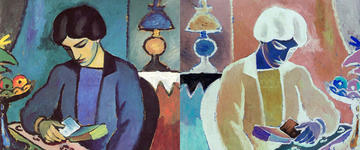Fictions of Retranslations: Retranslating Language and Style in Prose Fiction

OCCT invites you to join us for a one-day virtual workshop on language and style in prose fiction retranslation. The workshop will be hosted online, on Teams, on 11-12 March 2021. If you would like to attend as external participant, please contact anna.saroldi@ell.ox.ac.uk and rowan.anderson@ell.ox.ac.uk.
Scholars such as Brisset, Deane-Cox and Susam-Sarajeva have each highlighted the lack of critical writing on retranslation, particularly of prose retranslation. This lacuna stands in stark contrast with the critical focus on retranslation of poetry, partly because the practical limitations of publishing constraints mean that fewer prose translations are produced, and partly because of the idea that only poetry contains ‘poetic language’ and is therefore open to a wider degree of interpretation and variance in translation. However, research in literary translation has in recent years moved beyond the idea that poetry is the only form of literature that can be defined as ‘poetic’, and the tentative critical shift towards a focus on retranslation points to the fact that poetic language within prose can lead to a myriad of interpretations and versions of an original text. More recently, Matthew Reynolds has proposed that all translation should be seen as ‘paradigmatically generating multiple texts' (Prismatic Translation, 2020), and the Prismatic Jane Eyre project has asserted the interest of studying hundreds of retranslations in tens of languages. In this context, as graduate students and early career researchers, we wish to explore the consequences of this shift for our understanding of prose (re-)translation more broadly, in order to explore the issues of how poetic language generates retranslations, and how this might affect our analysis of other contexts for studying retranslation, such as censorship, multilingualism, and biographical studies of translators. We therefore welcome researchers from a rich variety of backgrounds, including literary studies, cultural studies, and translation studies. We are delighted to be able to bring researchers together from across these disciplines in order to start a stimulating and productive discussion.
Our panels will be exploring some of the following topics:
- How do we locate poetic language within prose? What theoretical framework can we use for classifying language as poetic?
- How does one define ‘taking liberty’ in retranslating prose, in the light of arguments such as Karen Emmerich’s Literary Translation and the Making of Originals, which calls into question the fixity of the original text?
- Publishing: the question of the ‘celebrity’ retranslator who ‘becomes’ the author, i.e., Simon Armitage, Lydia Davis.
- Multilingual prose: how might questions about retranslation apply to texts written in several languages, or for languages not considered standardised, i.e., Scots, Patois?
- How might retranslation be affected by changing approaches to censorship, whether that be tacit or legal?
- Metaphors of (re)translation: what are common metaphors that translators use for discussing their work, such as love, jealousy, art, and how might this influence our critical approach?
- How does retranslation influence the process of critical renewal, re-readings, and new interpretations?
- How does retranslation influence the canon? Does retranslating alter the canon, or ‘canonise’ marginalised authors?
PROGRAMME
Thursday 11 March
2.30pm – Welcome session and introductions
3pm – New methodologies in (re)translation studies
3pm - Arianna Autieri - ‘James Joyce’s music performed: the “Sirens” fugue in experimental re-translation-s'
3.20pm - Lauri A. Niskanen – ‘The dialogue of the Finnish and Swedish (re)translations of James Joyce’s Ulysses: The Polyphonic Translation Model as a critical model for the study of retranslations of prose fiction’
3.40pm - Byron Taylor – ‘Back-translation, retranslation, and the prosody in-between’
4pm - Questions and discussion
4.30pm - Break
5pm – Talk: ‘Translation and Retranslation: priorities, discoveries, pleasures’ (organised by TORCH)
Oliver Ready (St Antony’s College) and Sasha Dugdale (Writer in Residence, St John’s College, Cambridge), two leading translators from the Russian, will discuss their work.
Friday 12 March
1pm – Welcome to second day
1.15pm – Politics and Censorship in Retranslation
1.15pm - Aoife Cantrill - ‘Rewriting in the shared script: Retranslation, non-translation and the politics of Taiwan’s Japanese language fiction’
1.35pm - Amélie Derome - ‘Retranslation as the craft of grafting: French retranslations of Tom Jones by Henry Fielding, Gulliver’s Travels by Jonathan Swift, and Tristram Shandy by Laurence Sterne (1795-2004)’
1.55pm– Elisa Bolchi - ‘Mother, artist, woman: (Re)reading To the Lighthouse in Nadia Fusini’s Italian retranslation’
2.15pm - Questions and discussion
2.45pm – Break
3.10pm – Return for next session
3.15pm – Agents and Agency in the Retranslated Text
3.15pm - Nadia Georgiou - ‘Acts, agents, and attitudes: (Re)translations of Alexandre Dumas Père’s Les Trois Mousquetaires/The Three Musketeers’
3.35pm – Višnja Krstić – ‘Punctuation in Prose Retranslation’
3.55pm - Ian Michael Ellison - ‘Prismatic Proust: Searches for Lost Time in German’
4.15pm – Discussion
4.45pm – Break
5.15pm – Discussion with Oliver Ready on his work as a translator
5.45pm – Teams happy half-hour


